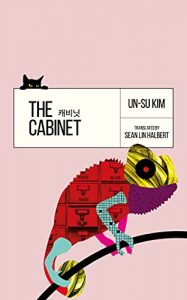Ian Mond Reviews The Cabinet by Un-Su Kim
 The Cabinet, Un-Su Kim (Angry Robot 978-0-85766-917-9, $14.99/£9.99, 400pp, tp) October 2021.
The Cabinet, Un-Su Kim (Angry Robot 978-0-85766-917-9, $14.99/£9.99, 400pp, tp) October 2021.
The publication of The Cabinet is a second (not a first) for both the author, Un-Su Kim, and publisher Angry Robot. While The Cabinet is Kim’s debut novel (winning South Korea’s Munhakdongne Novel Award back in 2006), it’s his second book to be translated into English. Somewhat confusingly, but typical for works in translation, English audiences were first exposed to Kim’s sophomore effort, The Plotters, released by Text Publishing in 2018. For Angry Robot, The Cabinet is their second translated novel, following on from the publication of Keren Landsman’s The Heart of The Circle in 2019 (a book I need to get around to reading). I note this – and the fact that Angry Robot has a third novel in translation coming out next October (The Village at the Edge of Noon by Darya Bobyleva) – because it’s important to recognise mainstream genre presses when they go to the effort (and expense) of publishing speculative fiction in translation.
Employed at an unnamed research institute in Seoul, The Cabinet’s protagonist Kong Deok-geun discovers Cabinet 13 tucked away in the file room on the building’s fourth floor. Out of sheer boredom – “All I did [in my job] was sit quietly in the corner of my office, staring out the window like an ornamental plant” – he picks the cabinet’s lock to find within “375 individual files: 375 examples of magic, 375 grievances, 375 bizarre, stubborn people.” Over the next several weeks, Kong reads through each case history, equally disgusted and fascinated by stories of people – labelled as symptomers – afflicted with a variety of unusual, even impossible, ailments. There are the “torporers” who, like bears during winter, hibernate for extended periods (as long as two years); and the “time skippers” who, without cause or explanation, vanish for days, months, or years at a time; and the “memory mosaicers,” who, cursed with the ability to modify their memories, delete so much of who they are they lose all sense of self. When Kong is confronted by the irascible, eccentric owner of Cabinet 13, Professor Kwon (who initially accuses Kong of spying for the mysterious “Syndicate”), he agrees to assist the Professor in his life’s work. To begin with, this means cleaning the Professor’s office and answering the phone, but as Kong becomes more involved in the lives of the symptomers, helping where he can, he begins documenting the birth of this new and varied species.
Regarding structure and theme, The Cabinet is reminiscent of Yan Ge’s Strange Beasts of China, which I reviewed in August. They are both wildly imaginative mosaic novels centred on the taxonomy of a unique and marginalised group of individuals. In chronicling beasts and symptomers, Yan Ge and Un-Su Kim not only question our understanding of what’s normal, but they also shine a light on humanity’s reflexive knack for shunning and exploiting those we consider to be “other.” Where The Cabinet differs from Strange Beasts of China is that the novel presents a stark and powerful portrait of loneliness. Initially, this theme of abandonment is embodied in the symptomers who, “hitherto considered an abomination” by an “intolerant scientific world,” are forced to “shut themselves in a cramped room to live a hard life, never having anyone to call for help.” As we learn more about Kong, we come to understand that he’s as lonely as the subjects he investigates. In particular, he tells us of the summer he spent locked in his apartment for 178 days, drinking beer and eating peanuts. The only person more unsociable than Kong is his work colleague, Son Jeong-Eun. She’s an introvert who does everything alone – “eating, working and going home” – and as such is teased by her co-workers, and in one harrowing scene verbally abused in public by the vice president of the Institute for being overweight, for eating awful food, and for never speaking up in meetings. Kong and Son do form a friendship of sorts – leading to an extraordinary set-piece at a sushi restaurant that suggests Son may be a symptomer – but it’s clear their feelings of isolation, of loneliness never truly diminish.
The mosaic structure of The Cabinet does mean that the over-arching plot involving the future stewardship of Cabinet 13 – a dying Professor Kwon wants to hand it over to Kong – and the growing threat of the Syndicate – who believe Kwon is hiding a world-changing genetic secret – feels, to me, rushed and underdeveloped (a feeling I had about Strange of Beasts of China). Yet it’s this very messiness, this anarchic quality, that I also found appealing about The Cabinet. How in the space of a few pages, whether it’s the Adams-esque gag of a research institute where no-one conducts research, or the bizarre tale of the man growing a ginkgo tree from his pinky, or the burgeoning, but oh-so awkward and fragile relationship, between Kong and Son, The Cabinet can be funny, absurd, and moving.
Ian Mond loves to talk about books. For eight years he co-hosted a book podcast, The Writer and the Critic, with Kirstyn McDermott. Recently he has revived his blog, The Hysterical Hamster, and is again posting mostly vulgar reviews on an eclectic range of literary and genre novels. You can also follow Ian on Twitter (@Mondyboy) or contact him at mondyboy74@gmail.com.
This review and more like it in the December 2021 issue of Locus.
 While you are here, please take a moment to support Locus with a one-time or recurring donation. We rely on reader donations to keep the magazine and site going, and would like to keep the site paywall free, but WE NEED YOUR FINANCIAL SUPPORT to continue quality coverage of the science fiction and fantasy field.
While you are here, please take a moment to support Locus with a one-time or recurring donation. We rely on reader donations to keep the magazine and site going, and would like to keep the site paywall free, but WE NEED YOUR FINANCIAL SUPPORT to continue quality coverage of the science fiction and fantasy field.
©Locus Magazine. Copyrighted material may not be republished without permission of LSFF.






